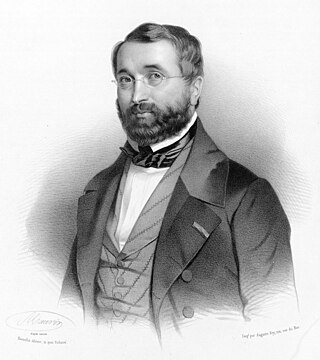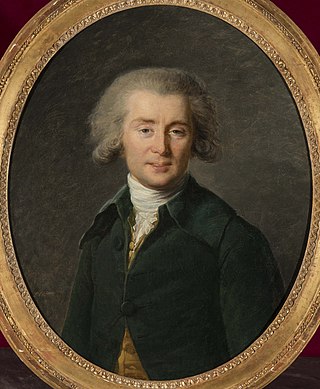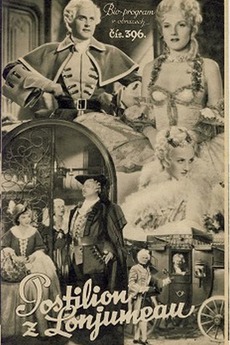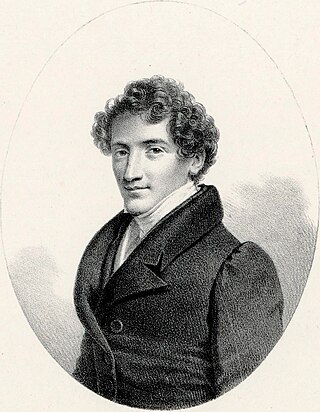
Adolphe Charles Adam was a French composer, teacher and music critic. A prolific composer for the theatre, he is best known today for his ballets Giselle (1841) and Le corsaire (1856), his operas Le postillon de Lonjumeau (1836) and Si j'étais roi (1852) and his Christmas carol "Minuit, chrétiens!".

Si j'étais roi is an opéra comique in three acts by Adolphe Adam. The libretto was written by Adolphe d'Ennery and Jules-Henri Brésil. It was first performed in Paris at the Théâtre Lyrique on 4 September 1852, opening with a dual cast to allow performance on successive evenings. The production was considered lavish, with expensive costumes and jewels being worn by the cast.

La Vie parisienne is an opéra bouffe, or operetta, composed by Jacques Offenbach, with a libretto by Henri Meilhac and Ludovic Halévy.

Le Cheval de bronze is an opéra comique by the French composer Daniel Auber, first performed on 23 March 1835 by the Opéra-Comique at the Salle de la Bourse in Paris. The libretto is by Auber's regular collaborator, Eugène Scribe and the piece was a great success in its day. In 1857, it was transformed into an opera-ballet, but this did not hold the stage. The overture is one of Auber's most popular. The first-act finale expands on the final phrases from the first-act finale of Mozart's Così fan tutte. The composer tried to reflect the Chinese setting of the story in the music.

L’épreuve villageoise is an opéra bouffon in two acts by André Grétry to a French libretto by Pierre Desforges.

Le pré aux clercs is an opéra comique in three acts by Ferdinand Hérold with a libretto by François-Antoine-Eugène de Planard based on Prosper Mérimée's Chronique du temps de Charles IX of 1829.

Olimpie is an opera in three acts by Gaspare Spontini. The French libretto, by Armand-Michel Dieulafoy and Charles Brifaut, is based on the play of the same name by Voltaire (1761). Olimpie was first performed on 22 December 1819 by the Paris Opéra at the Salle Montansier. When sung in Italian or German, it is usually given the title Olimpia.
Le lac des fées is a grand opera in five acts composed by Daniel Auber to a French libretto by Eugène Scribe and Mélesville. The story is set in the Harz Mountains and based on a German ballad. The opera was premiered by the Paris Opera at the Salle Le Peletier on 1 April 1839.
Achille-Félix Montaubry was a French musician and operatic tenor, active in Paris; later a theatre director. His brother was the conductor and composer Édouard Montaubry (1824–1883).

Robert Bruce is an 1846 pastiche opera in three acts, with music by Gioachino Rossini and Louis Niedermeyer to a French-language libretto by Alphonse Royer and Gustave Vaëz. The plot concerns the defeat of the forces of Edward II of England by Robert the Bruce, King of Scots, and is adapted from Walter Scott's History of Scotland. The music was stitched together by Niedermeyer, with the composer's permission, with pieces from La donna del lago, Zelmira, and other Rossini operas. The work was premiered on 30 December 1846, by the Paris Opera at the Salle Le Peletier. The audience may not have noticed, but the orchestra included for the first time a recently invented instrument, which later came to be known as the saxophone.

Jean-Vital Jammes was a French opera singer. During a stage career spanning 40 years, he created many leading baritone roles, including Zurga in Bizet's Les pêcheurs de perles and Ourrias in Gounod's Mireille. Born in Le Passage d'Agen near the town of Agen, he was largely self-taught and made his stage debut in 1841 at the age of 16. After singing in several provincial theatres, he was engaged by the Théâtre Lyrique in Paris and later by the Opéra-Comique. Following his retirement from the stage, Ismaël lived in Marseille where he died at the age of 68.

The Postman from Longjumeau is a 1936 Austrian-Swiss musical comedy film directed by Carl Lamac and starring Carl Esmond, Rose Stradner and Alfred Neugebauer. The film is known by several alternative titles including Der König lächelt – Paris lacht. It is loosely based on the 1836 opera Le postillon de Lonjumeau by Adolphe Adam. In eighteenth-century France, a Postilion from Longjumeau is summoned by Madame de Pompadour to sing in her opera company, forcing him to be separated from his wife.

Henri Valentino was a French conductor and violinist. From 1824 to 1832, he was co-conductor of the Paris Opera, where he prepared and conducted the premieres of the first two grand operas, Auber's La muette de Portici and Rossini's Guillaume Tell. From 1832 to 1836, he was First Conductor of the Opéra-Comique, and from 1837 to 1841, conductor of classical music at the Concerts Valentino in a hall on the rue Saint-Honoré in Paris.

Geneviève-Aimé-Zoë Prévost was a French operatic soprano. She created leading roles in some of the most notable French opéras comiques of the first half of the nineteenth century, including "Fra Diavolo" by Daniel Auber and "Le postillon de Lonjumeau" by Adolphe Adam.

Jean-Baptiste Marie Chollet was a French musician and operatic singer. He also composed a few romances and nocturnes. He married the opera singer Geneviève-Aimé-Zoë Prévost and their daughter Caroline Chollet also became an opera singer under the stage name Mademoiselle Monrose.

Constance-Caroline Lefebvre, sometimes spelled Lefèvre, was a French mezzo-soprano and soprano opera singer who started her career in 1849 and retired in 1866, mostly playing "dugazon" roles. She married her stage partner, baritone and composer Jean-Baptiste Faure, in 1859.
Michael Spyres is an American operatic baritenor. He is particularly associated with the bel canto repertoire, especially the works of Rossini, and heroic roles in French grand opera.

Caroline Grassari, born Marie-Caroline-Josephine Gérard was a French opera singer active at the Paris Opéra from 1816 to 1828 where she sang leading soprano roles. Amongst the many roles she created were Almazie in Isouard's Aladin ou La lampe merveilleuse and Aurora in Carafa's La belle au bois dormant.

Alexandrine Marie Agathe Gavaudan-Ducamel was a French opera singer who sang leading soprano roles at the Opéra Comique for over 20 years. Born in Paris with the surname "Ducamel", she later married the tenor Jean-Baptiste-Sauveur Gavaudan after which she generally performed under the name Madame Gavaudan. She retired from the stage in 1822 and spent her later years in Passy where she died at the age of 68.
Marie-Françoise-Adélaïde Gavaudan, called Mlle Gavaudan cadette and nicknamed Spinette (1767–1805), was a French operatic soprano.

















